If you’re searching for a Streak CRM alternative, you’re probably looking for something more flexible, more powerful, and better suited to your growing business. Maybe you’re in need of more robust automation features, or you’re finding the pricing hard to justify as your team expands. Or perhaps you’re just after a CRM solution that offers deeper Gmail and Google Workspace integration without sacrificing usability. 📧
We’ve compared the best Streak CRM alternatives on the market today, looking closely at automation, workflow customization, email tracking, and sales pipeline management. You’ll learn how each tool stacks up in terms of functionality, ease of use, customer support, and scalability. 📈
Here at Method CRM, we’ve been supporting QuickBooks-based businesses for more than 14 years. Method is highly regarded by business owners across a range of industries for its two-way QuickBooks sync, end-to-end sales automation, and no-code customizations. In this article, we’ll take a closer look at what makes a strong replacement for Streak and how Method can be an asset to your growing business. 🌱
Best alternative to Streak: What to look for
If you’re thinking about moving on from Streak CRM, the key is to find a CRM solution that addresses your pain points and improves your processes. The right alternative should fit seamlessly into your existing Google Workspace, reduce manual work through automation, alleviate bottlenecks, and scale as your business grows without overwhelming your team or your budget.
Here’s what to look for in a tool that can optimize your business operations.
Gmail and Google Workspace integration 📩
If you’ve been using Streak, you’re used to managing your entire sales pipeline without leaving your inbox. That would be hard to give up, and thankfully, you don’t have to. One of the most important features to prioritize in a Streak CRM alternative is deep, native Gmail integration.
Look for CRMs that don’t just sync with Gmail but feel like an extension of it. That means you should be able to track emails, update contact records, and manage deals directly from your inbox. Bonus points for tools that also integrate with other Google Workspace apps like Calendar, Drive, and Sheets, so your sales activities stay connected and streamlined.
CRMs like Method, NetHunt, and Copper all offer strong Gmail experiences, but the depth of that integration and how it ties into the rest of your workflows can vary significantly.
Better automation tools and templates ⚙️
If you’re still manually sending follow-up emails or moving deals between stages, your CRM isn’t pulling its weight.
The best CRM software for growing teams should do more than store contact info. It should actively help you sell. That means smart automation tools that trigger actions based on your lead’s behaviour, customizable email templates that save you from writing the same messages over and over, and scheduled reminders that keep you one step ahead.
For example, Method CRM lets you build custom workflows that automatically assign tasks, send out pre-written follow-ups, and even notify your team when deals go cold. While you save time, you keep your sales process consistent and scalable, no matter how many leads you’re managing.
Customizable workflows that scale with growth 🔀
Your sales process is unique to your business. A good sales CRM should respect that.
While Streak offers a simple pipeline system, it can be limiting, especially when you need to track different stages for different services, products, or teams. The right alternative should let you build custom workflows from the ground up. That includes defining your own stages, setting up conditional rules, and tailoring the CRM to match your real-world operations.
Method CRM stands out here with its no-code customization capabilities. You can design workflows that reflect how your business actually works, whether you’re managing leads, handling support tickets, or following up on quotes. And because it’s fully scalable, you can evolve those processes as your business grows.
No more throwing together solutions in spreadsheets—just clear, consistent, automated steps from lead to close.
Real customer support and training 🤝
When you require CRM support, it’s an asset to have help from a human representative, not just a forum thread or chatbot loop.
Some users have reported that with Streak, customer support can be limited. If you’re switching tools, looking for one that offers more robust support may be the right move.
Seek out a CRM that offers multiple support channels (like chat, phone, or email), along with guided onboarding and plenty of training resources. You want your team to feel confident using the tool, not overwhelmed.
Method CRM goes the extra mile by offering live onboarding sessions, expert support, and a library of tutorials designed for small businesses. That level of service can make a huge difference during setup and everyday use, especially if you’re not a tech expert.
Transparent pricing (with flexible plans) 🏷️
At $49 per user per month, Streak’s cost can add up fast, especially when you consider how limited some of the features are at that price point.
When searching for a CRM tool, it’s important to look for transparent pricing with different tiers that let you pay for what you actually need. No matter what type of business you run, the platform should give you flexibility without locking essential tools behind high-cost plans.
Bigin by Zoho CRM, for example, offers a very affordable starting plan for early-stage businesses, while Method provides more powerful tools at $25 per user per month, including automation, Gmail integration, and support. That’s a big win if you’re looking to maximize value without sacrificing functionality.
Top Streak CRM alternatives compared
There’s no shortage of CRMs claiming to be the next best thing, but not all of them are a good fit if you’re coming from Streak. If you’ve built your workflow around Gmail, value simplicity, and now need more powerful features like automation, custom workflows, and better pricing, the options below deserve a closer look.
We’ve compared five of the top alternatives, starting with the most comprehensive all-in-one solution for small businesses and working toward more lightweight or budget-friendly picks.
1. Method CRM – Best all-around upgrade for small businesses
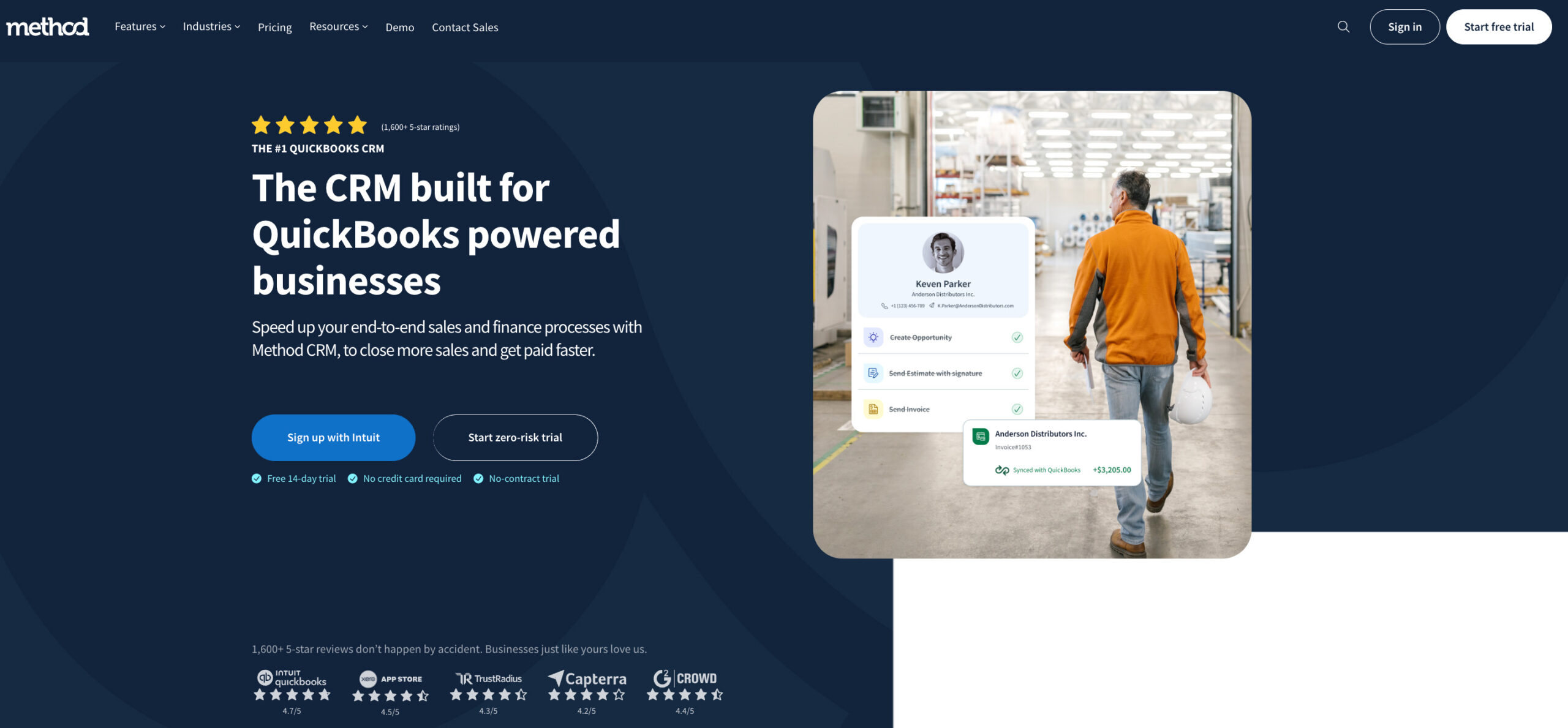
If you’re looking for a CRM that offers more robust functionality without losing Gmail integration, Method CRM is a clear winner.
Method is built for small and medium-sized businesses that want flexibility, automation, customization, and seamless integration with tools they already use. It’s particularly powerful if you’re using QuickBooks and Gmail together and want everything to sync up beautifully.
Why it stands out:
- Gmail and Google Workspace integration with email tracking and contact syncing.
- Deep, two-way QuickBooks integration for automatic syncing of customers, invoices, and payments.
- Drag-and-drop workflow customization with no coding needed.
- Built-in tools for lead management, email marketing, sales automation, and project tracking.
- Real-time dashboards for project management and custom reporting.
- Starts at $27 per user/month, with real human support and onboarding.
Method is a full customer relationship management platform that grows with your team. You can automate repetitive tasks, streamline your sales process, and manage customer data across departments all from one place.
Great for: Growing service-based businesses, accounting firms, and teams tired of juggling Gmail, spreadsheets, and disconnected tools.
2. folk CRM – Best Gmail-focused CRM for lightweight sales tracking
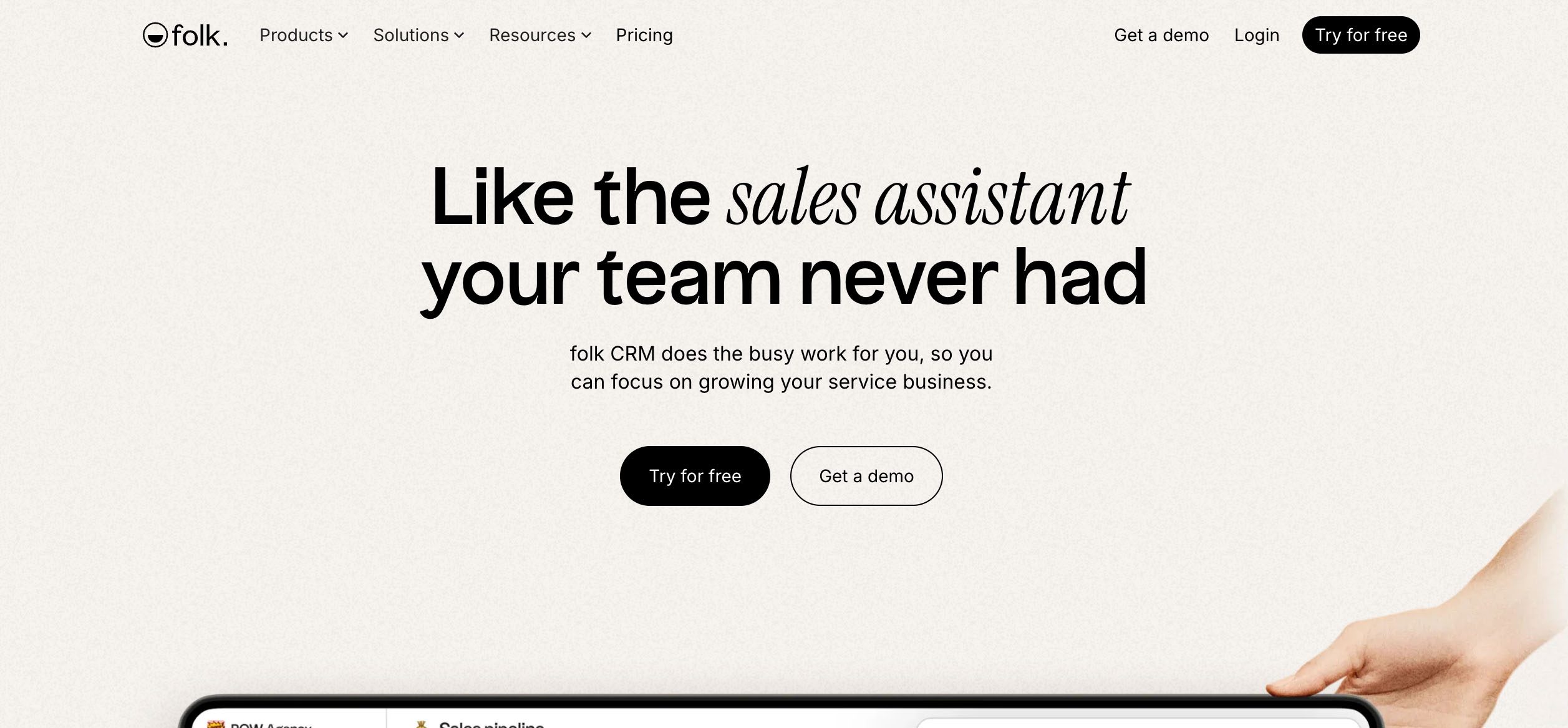
Folk CRM is a great choice if you want something simple, visual, and deeply tied into Gmail and LinkedIn. It’s designed to help small teams stay organized, track conversations, and manage contacts without overcomplicating things.
Why people love it:
- Built for Gmail users with browser extension and contact sync.
- Easy to use with a visually appealing interface.
- Offers a browser extension to help capture contacts from LinkedIn into your CRM.
- Offers basic workflow automation and smart reminders.
- Pricing starts at $20 per user/month on an annual plan.
folk is less of a full CRM platform and more of a sleek contact and outreach manager. It doesn’t offer accounting integration, extensive automation, or sales forecasting, but it keeps things light, fast, and focused.
Great for: Solopreneurs, freelancers, and small sales teams who rely heavily on Gmail and LinkedIn outreach.
3. NetHunt CRM – Best for teams deep in Google Workspace
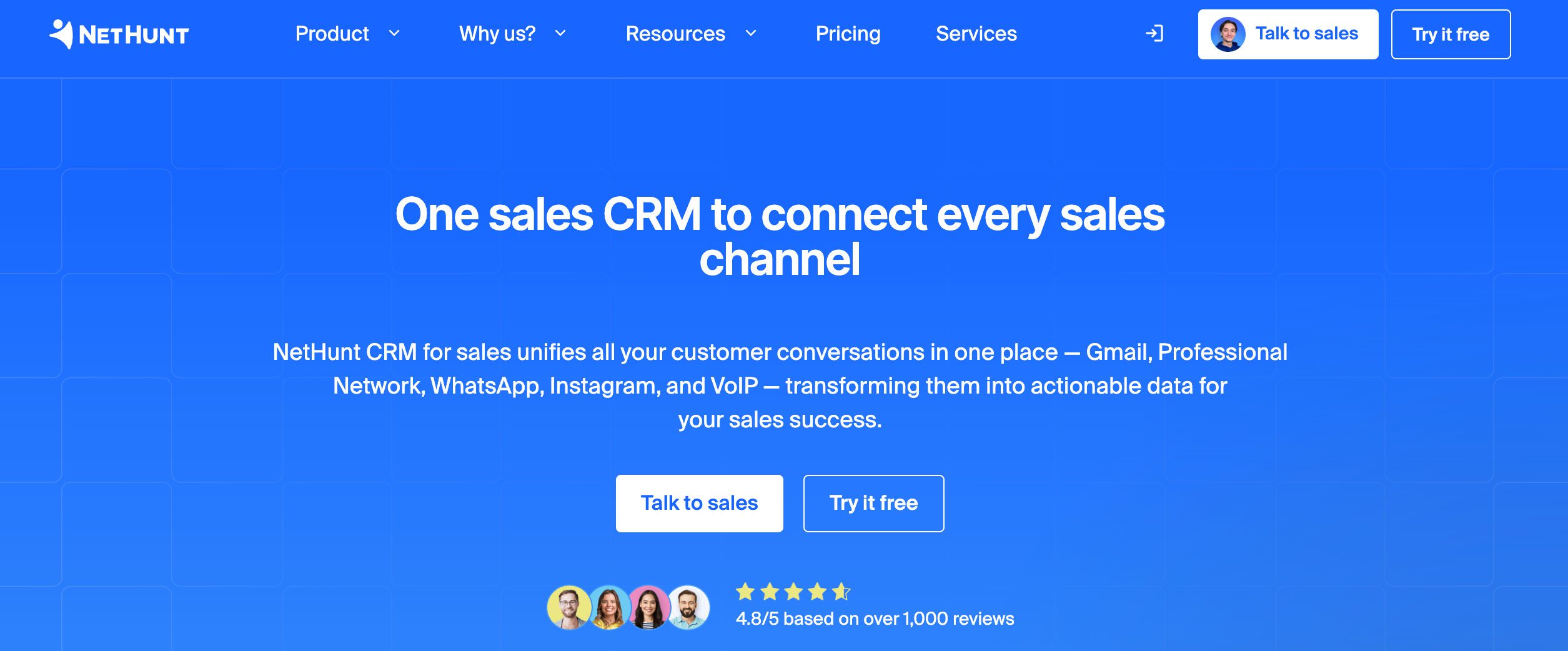
NetHunt is one of the most robust Gmail-based CRMs out there. It lives inside your inbox, so your CRM data and emails are always connected, and it adds powerful automation and workflow tools that make it great for growing teams.
What makes it unique:
- Full CRM built into Gmail.
- Organizes deals and contacts with folders, labels, and filters.
- Powerful email tracking, campaign tools, and follow-ups.
- Offers workflow automations and triggers.
- Starts at $24 per user/month on the annual plan.
NetHunt is built for sales teams that need structure and scalability inside the Gmail interface. You can set up drip campaigns, score leads, and track the sales pipeline right alongside your email conversations.
It’s important to note that the interface may feel overwhelming for first-time CRM users. It’s better suited to teams that are comfortable working inside Gmail with layers of functionality.
Great for: Startups and tech-forward businesses that use Google Workspace as their operating hub.
4. Copper CRM – Best for user interface and onboarding
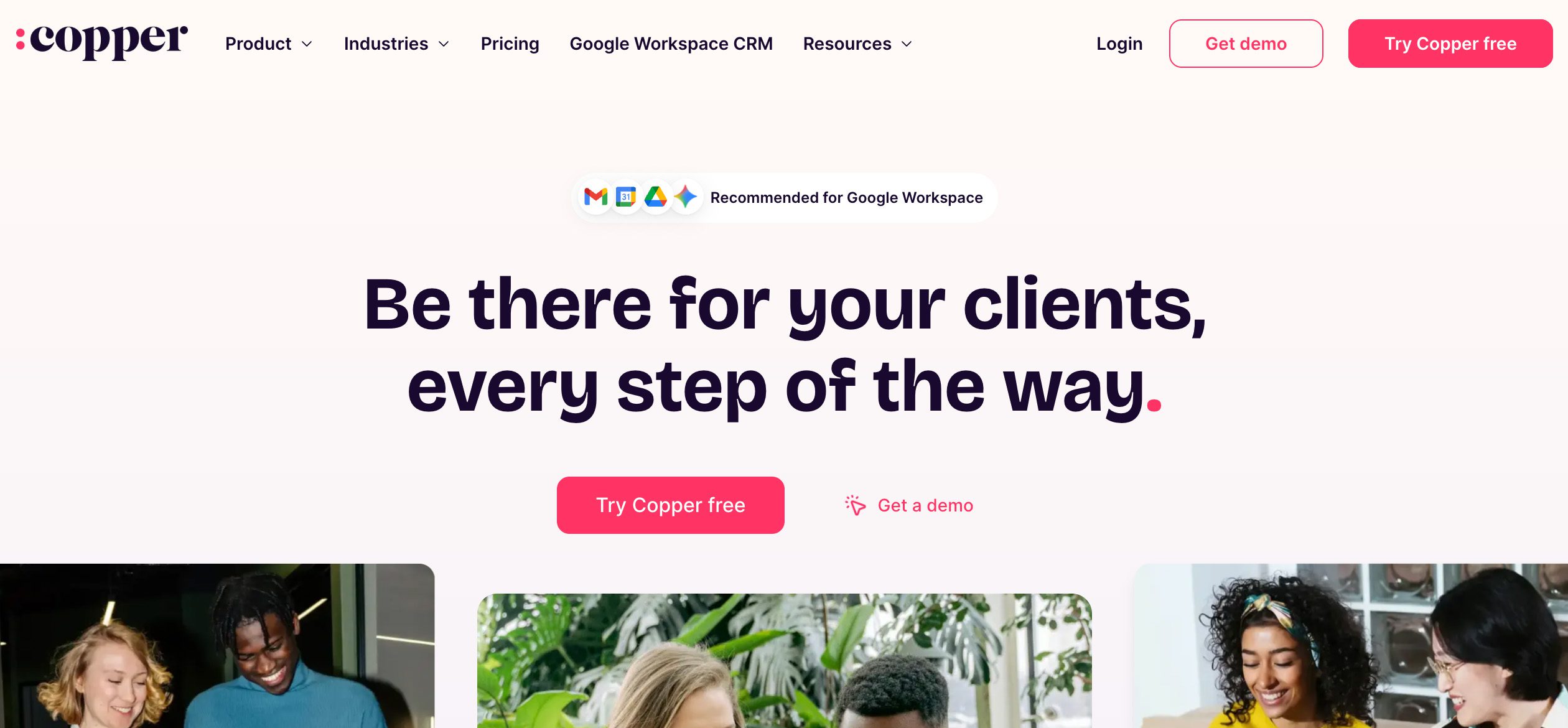
Copper is built for people who want a clean, Gmail-native CRM without the fuss. It’s designed to feel like a natural extension of Google Workspace and is especially friendly for teams new to CRMs.
Standout features:
- Deep Gmail, Calendar, and Drive integration.
- Visual pipeline management and task tracking.
- Intuitive UI that looks like Google products.
- Strong mobile experience and Chrome extension.
- Starts at $9 per user/month, billed annually, with higher tiers for automation.
Copper is very user-friendly, which makes onboarding fast. It offers some light marketing automation, email templates, and simple reporting, but more advanced users may find it limiting over time.
However, the platform does become more expensive as your feature needs grow, and it lacks the depth of customization and integrations that other CRMs offer.
Great for: Startups and small teams who want a familiar interface and fast setup with Gmail at the centre.
5. Bigin by Zoho CRM – Best for tight budgets
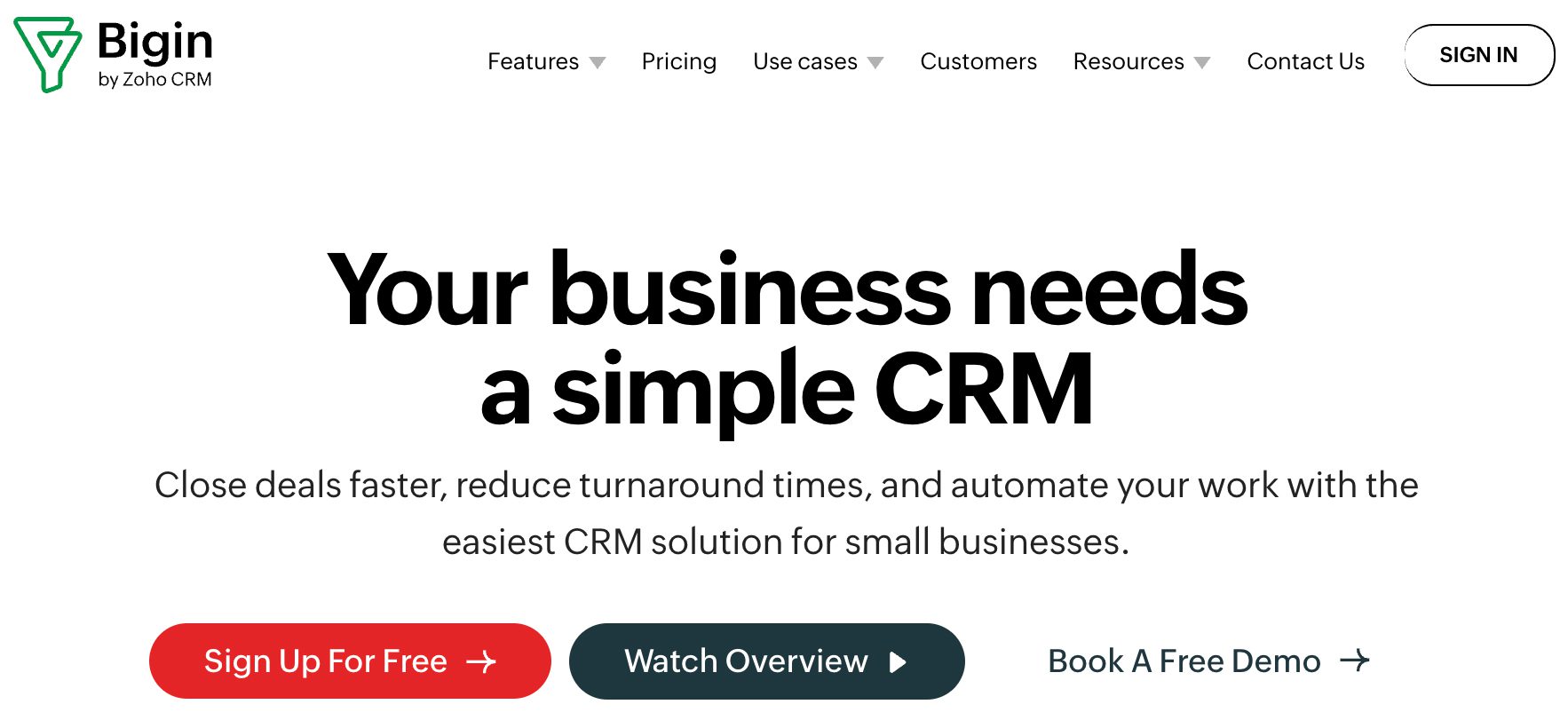
If you’re just getting started with CRM software and don’t want to spend a lot, Bigin by Zoho CRM is one of the most affordable options. While it’s not as Gmail-native as some others on this list, it offers a solid set of features for its price point.
What you’ll get:
- Basic sales pipeline and contact management.
- Simple automation tools and task tracking.
- Mobile app and web-based access.
- Integration with Zoho ecosystem.
- Starts at just $7 per user/month, with a free plan for single users.
Bigin is ideal if you’re coming from spreadsheets and want something more structured. Just be aware that the Gmail experience isn’t as seamless, and some features are locked behind Zoho’s larger CRM suite.
Great for: Early-stage businesses, solo founders, and teams looking for a CRM at a low cost.
READ MORE: How one supply and distribution company connected their fragmented workflows and saved hours with Method.
Comparing key features: Method vs. other CRMs
Choosing a new CRM isn’t just about finding something that works, but finding something that fits. You want the right mix of functionality, value, support, and integration with the tools you already use. To help you make an informed decision, here’s a side-by-side comparison of Method CRM against four top Streak alternatives: folk CRM, NetHunt, Copper, and Bigin.
Feature comparison table
We’ve compared them across five key areas that matter most to small businesses making the switch from Streak: Gmail integration, pricing, automation tools, customer support, and QuickBooks sync.
| Feature | Method CRM | folk CRM | NetHunt CRM | Copper CRM | Bigin by Zoho CRM |
| Gmail Integration | ✅ Yes | ✅ Yes | ✅ Yes | ✅ Yes | ⚠️ Partial |
| Pricing (Starting per user) | $27/month | $20/month | $24/month | $9/month | $7/month |
| Workflow Automation | ✅ Advanced | ⚠️ Basic | ✅ Advanced | ⚠️ Basic | ⚠️ Basic |
| Customer Support | ✅ Live + Onboarding | Email only | Chat & Docs | Email only | Email only |
| QuickBooks Sync | ✅ Native | ❌ No | ❌ No | ❌ No | ❌ No |
Where Method stands out: QuickBooks sync, deep customization, real support
What really sets Method CRM apart from the rest is how well it balances power with flexibility. Unlike most CRMs on this list, Method isn’t just built for email outreach or lead tracking but is designed to support your entire customer relationship management process, from sales to billing to follow-up.
- QuickBooks integration: Method is the only tool on this list with a real-time, two-way sync with QuickBooks. This is a game-changer for service-based businesses or anyone who wants to track quotes, invoices, and payments without bouncing between platforms.
- Deep customization: From custom fields to automation workflows, Method gives you the tools to shape the CRM around your business, not the other way around. And you don’t need to know how to code to do it.
- Customer support: While others offer email or chat support at best, Method includes live onboarding and access to a real support team who can walk you through everything from migration to automation setup.
If you’re looking for a long-term solution that grows with your business, Method is built for that journey.
Where Others Win: LinkedIn Sync (folk), Pricing (Zoho), Gmail-Native UI (Copper)
Of course, not every business needs full-blown customization or accounting integrations right away. Depending on your priorities, other CRMs might still be a great fit.
- folk CRM wins for simplicity and LinkedIn integration. If your outreach is heavily focused on relationship-building through email and social media, its contact management and follow-up tools are slick and user-friendly.
- Bigin by Zoho CRM takes the prize for affordability. At just $7 per user, it’s the best CRM on a budget. While it’s light on automation and doesn’t offer native Gmail or QuickBooks integration, it’s a great first step for teams moving off spreadsheets.
- Copper CRM is ideal if you want something that looks and feels like a Google product. It offers the most seamless Gmail-native UI, which makes onboarding incredibly easy for teams that already use Google Workspace every day.
Each CRM has its strengths, but when it comes to all-around functionality, scalability, and support, Method offers the most complete package for businesses ready to grow.
How to make the switch
Making the leap to a new CRM might sound intimidating, especially if your team has been using Streak for a while. But the good news is, the transition doesn’t have to be painful. With the right plan and tools, you can move your data, rebuild your workflows, and start seeing the benefits of your new CRM faster than you might expect.
Here’s a simple step-by-step approach to help you switch from Streak smoothly.
1. Exporting your pipelines and contacts 👥
Start by exporting all your current data from Streak. This includes your pipelines, contacts, emails, notes, and any custom fields you’ve created. Most of this can be done via a CSV file export from your Streak dashboard.
Make sure to review your exported file for completeness and formatting. Clean up duplicate entries, check that key fields like email addresses and company names are present, and organize your deal stages clearly. The cleaner your export, the easier your import will be.
2. Importing into Method (or other CRMs) 💻
Once your data is ready, you can import it into your new CRM. Most platforms, including Method, offer guided imports with field mapping so your data lands in the right place.
Method takes it a step further by offering onboarding support during your import process. That means you can ask questions, get help aligning your columns with the CRM fields, and ensure your information comes across exactly as needed.
If you’re moving to another tool, check whether they offer import templates or support documents to walk you through the process.
3. Rebuilding workflows with automation features 🛠️
Take a moment to review how your team actually works. Where are the bottlenecks? What emails are you sending over and over again? Which follow-ups slip through the cracks?
Now use your new CRM’s automation tools to rebuild those workflows. In Method, for example, you can create triggers that automatically assign tasks, send reminders, or email leads based on where they are in the sales pipeline. You can also set up templates to ensure your team is communicating consistently and professionally.
This step can transform how your team works, making your processes faster, more accurate, and easier to scale.
Bonus: Free templates and onboarding resources from Method 📄
If you’re moving to Method, you’ll get access to a library of pre-built templates and automation blueprints. These are designed specifically for small businesses and cover everything from lead capture to invoice follow-up.
Even better, Method’s support team will walk you through the setup during onboarding. So whether you’re new to CRM software or just need a little guidance, you won’t be left figuring it out alone.
Final Thoughts: Choosing the Right Fit
There’s no one-size-fits-all CRM. The right platform for your team depends on where you are in your growth journey and what your priorities are right now.
Here’s how to narrow it down.
If you’re growing and ready for real CRM functionality ➡️ Method
If your team is expanding and your sales process is starting to feel too complex for Streak or spreadsheets, Method CRM is built for you. It gives you full control over your workflows, lets you customize every stage of your sales pipeline, and integrates deeply with Gmail and QuickBooks.
With advanced automation, real-time dashboards, and live onboarding support, Method is a long-term solution that grows alongside your business. It’s a great choice for small teams who need more structure, scalability, and support without losing flexibility.
If you want to stay lightweight and Gmail-native ➡️ folk or Copper
Sometimes, less is more. If your workflow is tightly tied to Gmail and you just want a more polished way to manage leads, folk and Copper both keep things light and simple.
Folk is ideal for contact-driven outreach with the added bonus of LinkedIn sync, while Copper offers a user-friendly interface that feels like a natural part of Google Workspace. These are great options if you’re not ready for heavy automation or deep customization, but still want to organize your sales efforts more effectively.
If you’re very early-stage ➡️ Bigin or NetHunt
If you’re just getting started and watching your budget closely, both Bigin by Zoho CRM and NetHunt CRM offer great entry points.
Bigin keeps things affordable and straightforward, making it ideal for teams moving off spreadsheets. NetHunt, on the other hand, offers deeper Gmail integration and stronger automation features, making it a better fit if you’re working within Google Workspace and want more power without going fully enterprise.
If you’re ready to take the next step with a platform that combines deep customization, powerful CRM features, and a smooth learning curve, Method CRM is a smart place to start. Try it for free and see how it can help you streamline your workflows, improve team performance, and grow your business with confidence.






